
The Holy Roman Empire, also known as the Holy Roman Empire of the German Nation after 1512, was a polity in Central and Western Europe, usually headed by the Holy Roman Emperor. It developed in the Early Middle Ages and lasted for almost 1,000 years until its dissolution in 1806 during the Napoleonic Wars.
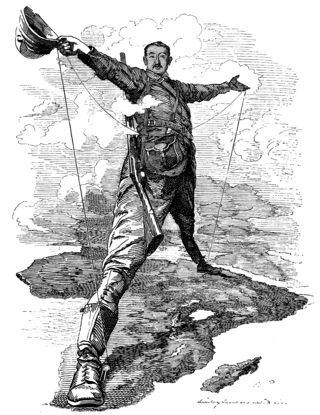
Imperialism is the practice, theory or attitude of maintaining or extending power over foreign nations, particularly through expansionism, employing both hard power and soft power. Imperialism focuses on establishing or maintaining hegemony and a more or less formal empire. While related to the concepts of colonialism, imperialism is a distinct concept that can apply to other forms of expansion and many forms of government.

The Qing dynasty, officially the Great Qing, was a Manchu-led imperial dynasty of China and the last imperial dynasty in Chinese history. It emerged from the Later Jin dynasty founded by a Tungusic-speaking ethnic group who became known as the Manchus. The dynasty was officially proclaimed in 1636 in Mukden, and following the Battle of Shanhai Pass it seized control of Beijing in 1644, which is often considered the start of the dynasty's rule in China. Within decades the Qing had consolidated its control over the whole of China proper and Taiwan, and by the mid-18th century it had expanded its rule into Inner Asia. The dynasty lasted until 1912 when it was overthrown in the Xinhai Revolution. In Chinese historiography, the Qing dynasty was preceded by the Ming dynasty and succeeded by the Republic of China. The multiethnic Qing dynasty assembled the territorial base for modern China. It was the largest imperial dynasty in the history of China and in 1790 the fourth-largest empire in world history in terms of territorial size. With 419,264,000 citizens in 1907, it was the most populous country in the world at the time.
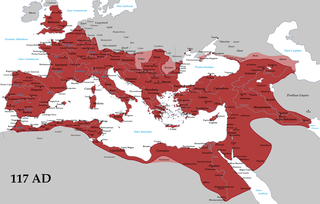
The Roman Empire was the post-Republican state of ancient Rome and is generally understood to mean the period and territory ruled by the Romans following Octavian's assumption of sole rule under the Principate in 31 BC. It included territory in Europe, North Africa, and Western Asia, and was ruled by emperors. The fall of the Western Roman Empire in 476 conventionally marks the end of classical antiquity and the beginning of the Middle Ages.

The eastern imperial eagle is a large bird of prey that breeds in southeastern Europe and extensively through West and Central Asia. Most populations are migratory and winter in northeastern Africa, the Middle East and South and East Asia. Like all eagles, the eastern imperial eagle is a member of the family Accipitridae. Furthermore, its feathered legs mark it as a member of the subfamily Aquilinae. It is a large, dark-colored eagle, with a resemblance to other members of the genus Aquila but it is usually the darkest species in its range. This is an opportunistic predator that mostly selects smallish mammals as prey but also a fairly large proportion of birds, reptile and other prey types, including carrion. Compared to other Aquila eagles, it has a strong preference for the interface of tall woods with plains and other open, relatively flat habitats, including the wooded mosaics of the steppe. Normally, nests are located in large, mature trees and the parents raise around one or two fledglings. The global population is small and declining due to persecution, loss of habitat and prey. It has therefore been IUCN Red Listed as Vulnerable since 1994.

The Empire of Japan, also referred to as the Japanese Empire, Imperial Japan, or simply Japan, was the Japanese nation-state that existed from the Meiji Restoration in 1868 until the enactment of the reformed Constitution of Japan in 1947. From 29 August 1910 until 2 September 1945, it administered the naichi and the gaichi. The South Seas Mandate was a single Japanese dependent territory in the name of the League of Nations under Japanese administration. In the closing stages of World War II, with Japan defeated alongside the rest of the Axis, the formalized Japanese Instrument of Surrender was issued in compliance with the Potsdam Declaration of the victorious Allies, and Japanese de facto territory subsequently shrunk to cover only the Japanese archipelago as it is today.

The Roman provinces were the administrative regions of Ancient Rome outside Roman Italy that were controlled by the Romans under the Roman Republic and later the Roman Empire. Each province was ruled by a Roman appointed as governor.
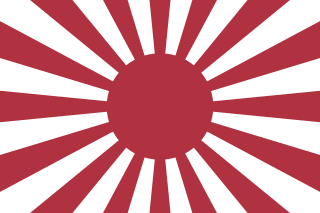
The Imperial Japanese Army (IJA) was the principal ground force of the Empire of Japan. Forming one of the military branches of the Imperial Japanese Armed Forces (IJAF), it was controlled by the Imperial Japanese Army General Staff Office and the Army Ministry, both of which were nominally subordinate to the Emperor of Japan, the supreme commander of IJAF. During the 20th century, an Inspectorate General of Aviation became the third agency with oversight of the IJA. At its height, the IJA was one of the most influential factions in the politics of Japan and was one of the most powerful armies in the world. The IJA was notorious for committing numerous war crimes before and during World War II, including the Second Sino-Japanese War, the Pacific War, the Nanjing Massacre and the Bataan Death March.

The Qajar dynasty was an Iranian dynasty founded by Mohammad Khan of the Qoyunlu clan of the Turkoman Qajar tribe.

Imperial Brands plc is a British multinational tobacco company headquartered in London and Bristol, England. It is the world's fourth-largest international cigarette company measured by market share after Philip Morris International, British American Tobacco and Japan Tobacco and the world's largest producer of fine-cut tobacco and tobacco papers.

The Dominate, also known as the late Roman Empire, is the despotic form of imperial government of the late Roman Empire. It followed the earlier period known as the Principate. Until the empire was reunited in 313, this phase is more often called the Tetrarchy.
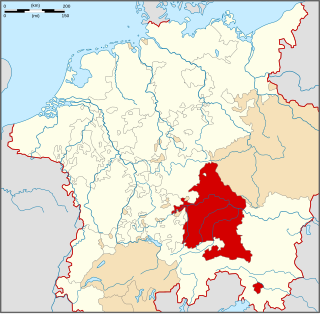
The Bavarian Circle was an Imperial Circle of the Holy Roman Empire.

The Imperial House, also referred to as the Imperial Family and the House of Yamato, is the royal family of Japan, consisting of those members of the extended family of the reigning emperor of Japan who undertake official and public duties. Under the present Constitution of Japan, the emperor is "the symbol of the State and of the unity of the people". Other members of the Imperial Family perform ceremonial and social duties, but have no role in the affairs of government. The duties as an emperor are passed down the line to their male children. This Japanese monarchy is the oldest continuous hereditary monarchy in the world. The Imperial House recognizes 126 monarchs, beginning with Emperor Jimmu, and continuing up to the current emperor, Naruhito. However, scholars have agreed that there is no evidence of Jimmu's existence, that the traditional narrative of Japan's founding is mythical, and that Jimmu is a mythical figure. Historical evidence for the first 25 emperors is mythical, but there is sufficient evidence of an unbroken agnatic line since the early 6th century. Historically, verifiable emperors of Japan start from AD 539 with Emperor Kinmei.

The Imperial Order of Saint Anna was a Holstein ducal and then Russian imperial order of chivalry. It was established by Karl Friedrich, Duke of Holstein-Gottorp, on 14 February 1735, in honour of his wife Anna Petrovna, daughter of Peter the Great of Russia.
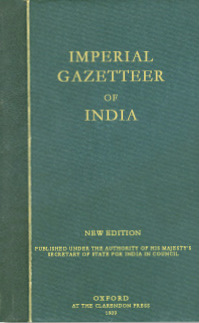
The Imperial Gazetteer of India was a gazetteer of the British Indian Empire, and is now a historical reference work. It was first published in 1881. Sir William Wilson Hunter made the original plans of the book, starting in 1869.

Imperial Valley Mall is an enclosed shopping mall in El Centro, California. Opened in 2005, the mall features J. C. Penney, Dillard's, and Macy's as its anchor stores. It is managed by CBL & Associates Properties.

Cetamolol is a beta adrenergic antagonist, more specifically a β1-adrenergic blocker.
The Imperial College COVID-19 Response Team is a group of experts from Imperial College London studying the COVID-19 pandemic and informing the government of the United Kingdom, and governments and public health agencies around the world. The team comprises scientists from the MRC Centre for Global Infectious Disease Analysis, the Jameel Institute, the Imperial College Business School and the Department of Mathematics. The Imperial College COVID-19 Response Team is led by Professor Neil Ferguson, Director of the Jameel Institute and MRC GIDA.















